The Tibetan New Year celebration, known as the Losar Festival, is one of Tibetan Buddhism’s most important events. Losar combines religious traditions with high-spirited celebrations through joyous devotion and cultural activities. The celebration of Losar spans Tibet, Nepal, Bhutan, and Indian regions with significant Tibetan Buddhist communities, including Ladakh, Sikkim, Arunachal Pradesh, and Himachal Pradesh. Losar embodies spiritual significance beyond its festive celebrations. The festival begins the new year by worshipping gods and goddesses and exorcising bad spirits while calling forth abundance. During Losar vibrant decorations fill monasteries and homes while streets bustle with chants and masked dances leading up to grand feasts.
Quick Detail
Date: February 28 to March 2
Duration: 15 days (main celebrations on the first three days)
Main Locations: Ladakh, Arunachal Pradesh, Sikkim, Dharamshala (Himachal Pradesh), Nepal, Bhutan, and Tibet
Significance: Tibetan New Year celebration based on the lunar calendar.
About Losar Festival
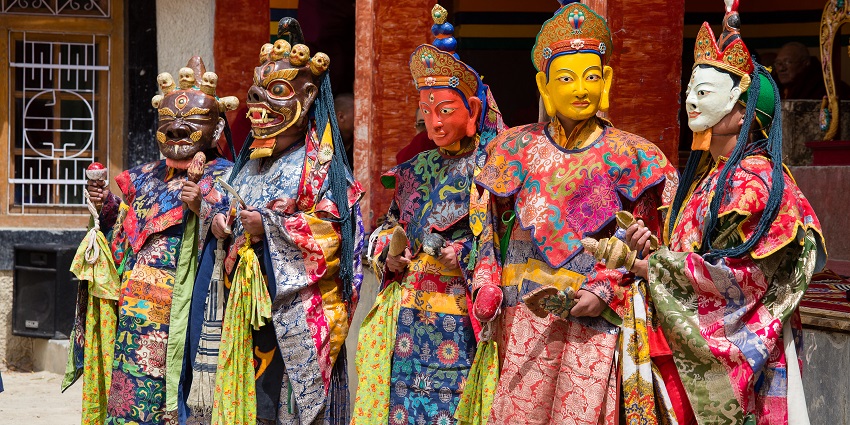
Photo: OlegD / Shutterstock / Image For Representation Only
The Tibetan term for “New Year,” Losar, marks a millennium of celebrations. The festival began as an agrarian tradition that paid homage to local gods but later developed connections to Buddhist customs. The first day of the lunisolar Tibetan calendar marks the beginning of Losar, which typically occurs in late January or February. The festival spans 15 days yet the primary celebrations occur during the initial three days.
Day 1 (Choe-nga Choepa): The first day involves cleaning homes while offering prayers and making the special barley beer known as “Changkol.”
Day 2 (Gyalpo Losar): On Official New Year’s Eve, families get together to enjoy traditional meals and share gifts.
Day 3 (Choe-kyong Losar): Community prayers, cultural performances, and festive gatherings.
Monasteries conduct elaborate events featuring monks who perform chaam masked dances and pray for the well-being of all beings. The famous “Metho” fire ritual takes place alongside burning aromatic herbs and lighting incense to ward off evil spirits.
Top Things To Do During Losar Festival
Explore these top things to do during the Losar Festival, covering traditional dances to unique rituals and prayers.
1. Witness The Spectacular Masked Cham Dances
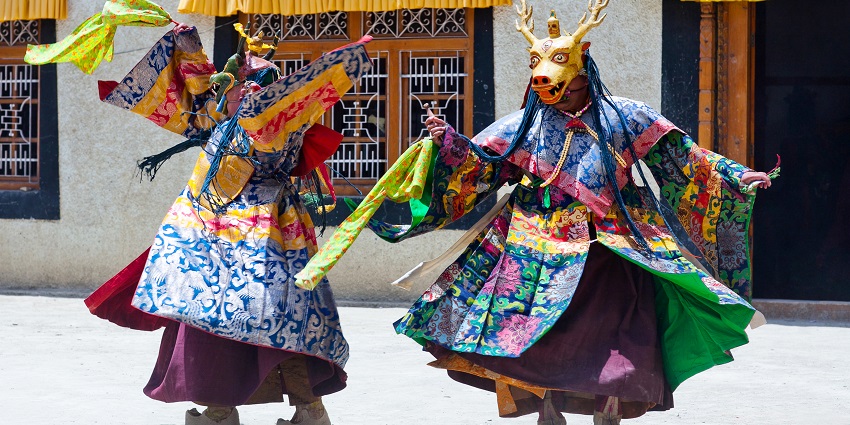
Photo: Storm Is Me / Shutterstock / Image For Representation Only
The Cham Dance is an important part of the Losar Festival because Buddhist monks perform this sacred ritual. These performances contain profound spiritual and religious meaning beyond their entertainment value. Through their elaborate costumes and fierce masks, dancers bring Buddhist mythological tales to life, illustrating the victory of good forces against evil. Every dance serves as a distinct element of Tibetan Buddhism through its depiction of deities and protectors as well as historical legends.
Where To Experience: Hemis Monastery (Ladakh), Tawang Monastery (Arunachal Pradesh), Rumtek Monastery (Sikkim)
2. Visit Monasteries And Take Part In Sacred Rituals
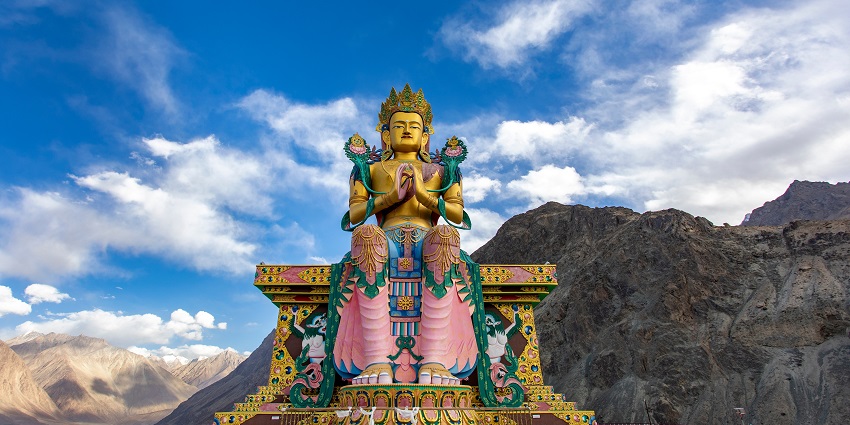
Photo: zakir1346 / Shutterstock
The spiritual traditions of Losar allow visitors to experience deep peace when exploring monasteries during this period. During their prayer sessions, monks chant ancient scriptures while lighting butter lamps and performing purification rituals.
Monks at numerous monasteries create a sacred altar with offerings that include barley, tsampa (roasted flour), fruits and sacred symbols. Devotees engage in turning prayer wheels and offering incense while presenting khata ceremonial scarves to receive blessings for the upcoming new year. Public meditation sessions take place at some monasteries where visitors can quietly sit and absorb the spiritual atmosphere.
Where To Experience: Diskit Monastery (Ladakh), Ghoom Monastery (Darjeeling), Key Monastery (Spiti)
3. Join The Losar Community Festivities & Cultural Performances
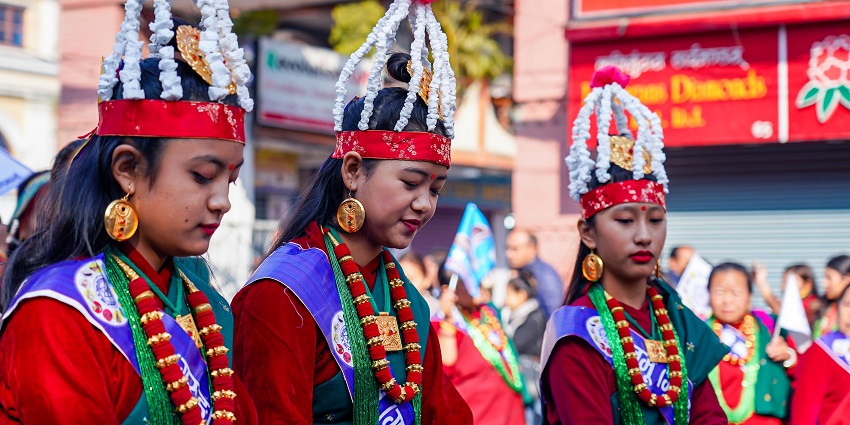
Photo: AP Tolang / Shutterstock / Image For Representation Only
To experience Losar at its best, you should participate in the community celebrations. Folk music and dance performances together with cultural exhibitions, take place in Himalayan towns where residents assemble to greet the new year. The performance combines storytelling elements with dance and musical numbers. Afterwards, the Yak Dance displays performers wearing bright yak outfits as they perform traditional Himalayan folk dance movements..
Where To Experience: Leh, Gangtok, Tawang, Spiti Valley
4. Explore The Bustling Tibetan Handicraft Markets
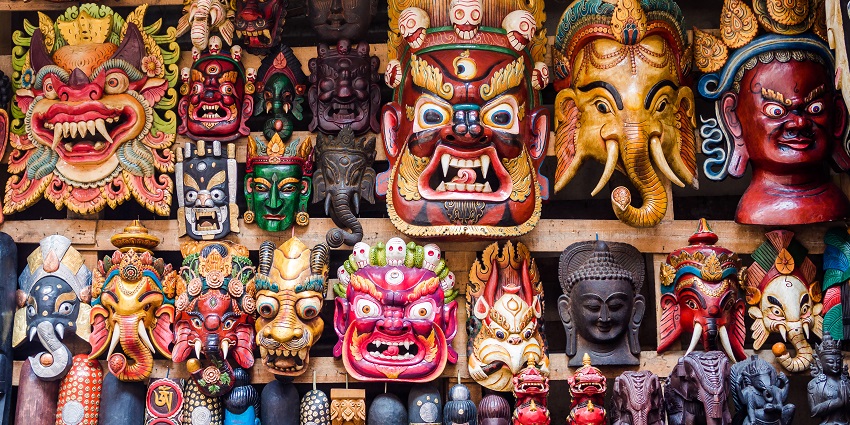
Photo: R.M. Nunes / Shutterstock
During Losar local markets become bustling shopping destinations filled with handcrafted items alongside traditional clothing and religious objects. During Losar Tibetan artisans run exclusive stalls offering products ranging from vibrant prayer flags to beautiful Thangka paintings.
During Losar, you should acquire a Tibetan prayer wheel because this cylindrical object contains mantras that people believe will bring good fortune when they spin it.
Where To Shop: Leh Main Bazaar, M.G. Marg (Gangtok), Kotwali Bazaar (Dharamshala)
5. Experience Fire Rituals & New Year Prayers
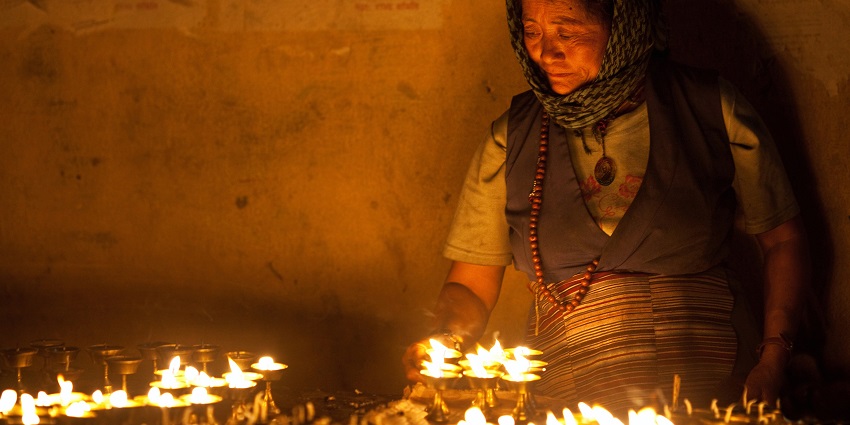
Photo: Storm Is Me / Shutterstock / Image For Representation Only
The spirit of Losar encompasses both festive activities and processes of purification and renewal. The festival dedicates an essential segment to using fire torches and effigy burns for the purpose of banishing negative spirits and purifying the environment. During ritual bonfires, local participants and monks burn juniper branches alongside paper prayers and symbolic representations of past troubles. The smoke serves to sweep away misfortune and clear the path for a successful new year ahead. During the Lama Losar Puja, monks perform blessing ceremonies which include chanting sacred mantras while using sacred objects like bells and vajras along with holy water.
Where To Experience: Tawang Monastery, Hemis Monastery, Key Monastery.
Top Places To Visit During Losar Festival
If you want to witness the grandest Losar celebrations, here are the top places to visit during the festival.
1. Leh-Ladakh
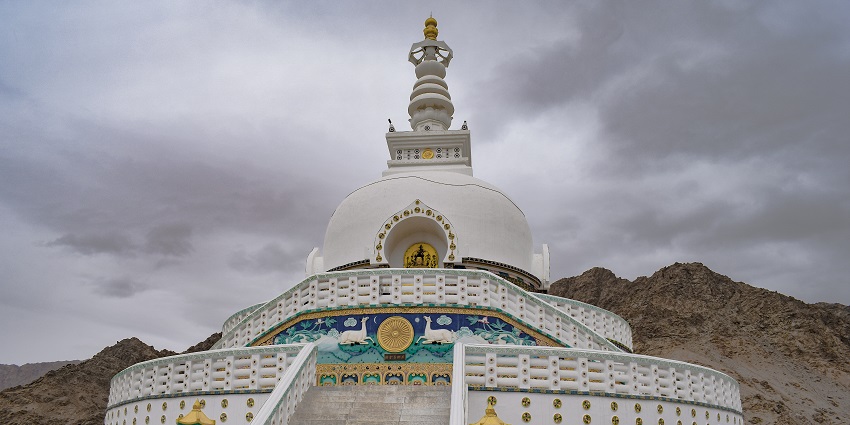
Photo: Reflectionsbyprajakta / Wikimedia Commons
Ladakh hosts a substantial population of Tibetan Buddhists, making it an ideal destination for experiencing Losar. Monastic ceremonies, alongside masked dances and cultural processions, illuminate the entire region. Hemis Monastery, Thiksey Monastery, and Spituk Monastery organise magnificent rituals and cultural performances at the Losar Festival Ladakh. Local marketplaces showcase vibrant decorations alongside prayer flags and authentic Tibetan food items.
How To Reach: Leh has an airport with regular flights from Delhi and Srinagar
2. Tawang Monastery
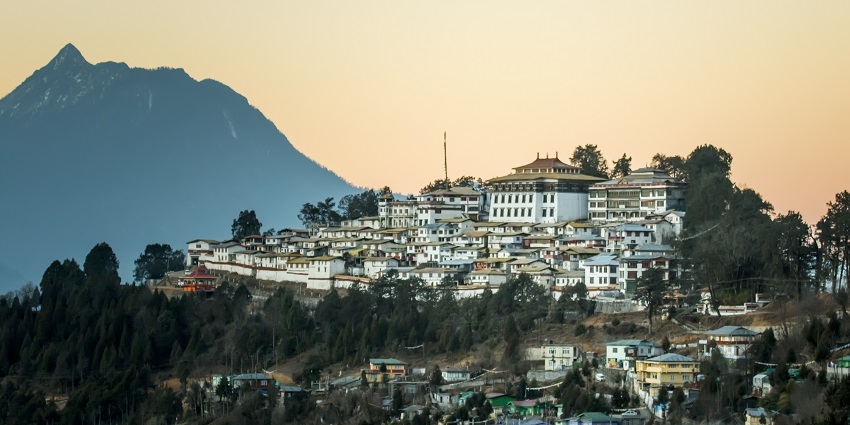
Photo: Vikramjit Kakati / Wikimedia Commons
Visiting India’s largest Buddhist monastery during the Losar Festival of Arunachal Pradesh makes the experience worth it for people. At the monastery people participate in spiritual chants along with religious processions and traditional cham dances. The town becomes vibrant with its illuminated streets and colourful prayer flags alongside local festivities.
How To Reach: Tourists can use Tezpur Airport, which lies 320 kilometres from Tawang Monastery
3. Rumtek Monastery
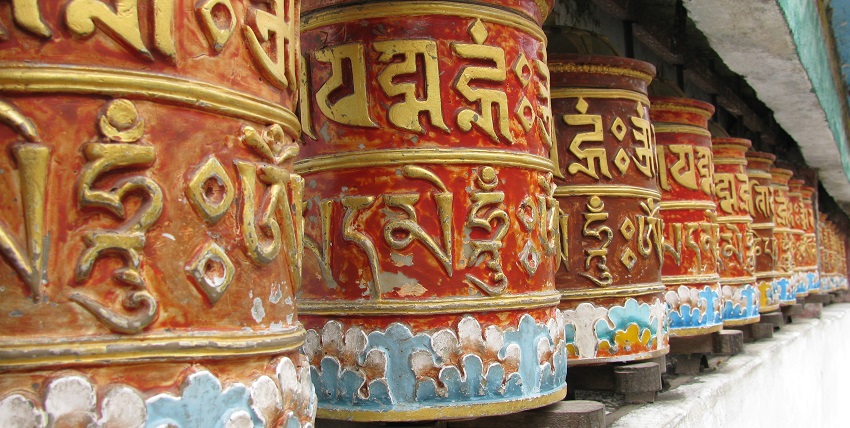
Photo: Sivakumar / Wikiemdia Commons
The Rumtek Monastery near Gangtok attracts many visitors because of its magnificent Losar festival Sikkim celebrations. The monastery conducts ritual prayers and offers vibrant performances along with butter lamp offerings. Visitors can have the chance to participate in Buddhist chanting while enjoying cultural music and traditional Sikkimese dishes from local food stalls.
How To Reach: The nearest airport is Bagdogra Airport (125 km away)
4. Spiti Valley
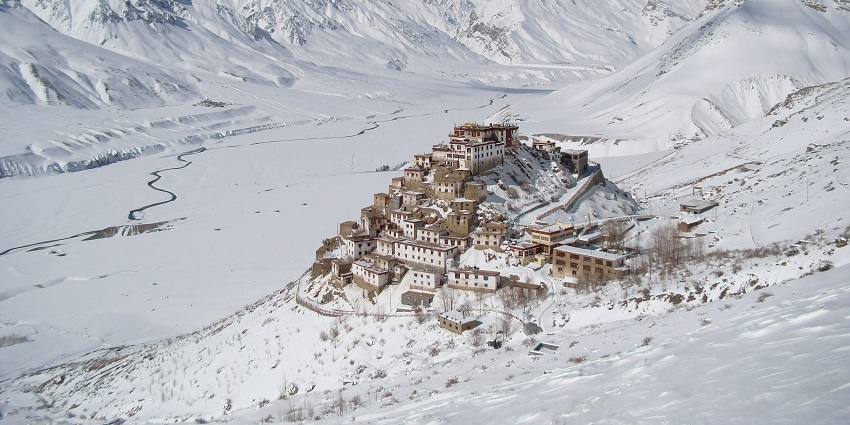
Photo: Ksuryawanshi / Wikimedia Commons
For a peaceful snow-covered Losar Festival in Himachal Pradesh, the Spiti Valley serves as the ideal spot. Key, Dhankar, and Tabo monasteries serve as venues for sacred rituals and folk performances. Traditional decorations along with prayer flags and fire torches, transform the valley’s celebrations into a magical spectacle.
How To Reach: Bhuntar Airport, located in Kullu, is the closest airport
Where To Eat
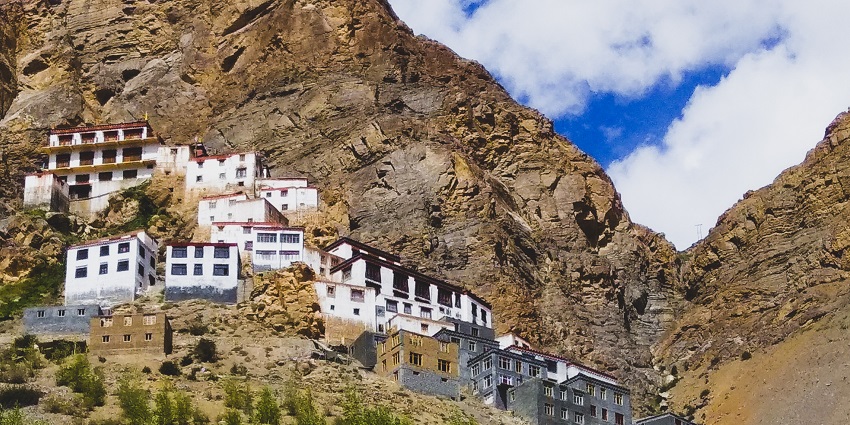
Photo: Nitinkambo / Wikimedia Commons / Image For Representation Only
Throughout the Losar Festival, local eateries, monasteries and homes create special Tibetan dishes that showcase the region’s cultural richness. Leh Market in Ladakh features cosy Tibetan restaurants such as The Tibetan Kitchen and Lamayuru Restaurant, which serve authentic momos, thukpa, and butter tea. The Dragon Restaurant and Orange Restaurant in Tawang, Arunachal Pradesh, offer delicious Tibetan soups, stews, and fried bread. During Losar celebrations in Gangtok, Sikkim, make sure to visit Taste of Tibet and Roll House to sample their warm Gyathuk (Tibetan noodle soup) and Shapta (stir-fried meat with vegetables).
Traditional Losar Dishes to Try
- Guthuk: A special noodle soup prepared with nine ingredients, eaten on Losar Eve to cleanse bad luck.
- Khapse: Fried biscuits made from wheat flour and butter, shaped into intricate designs.
- Dresil: A sweet rice dish mixed with butter, raisins, and nuts, served as a good luck dish.
- Chang: A traditional Tibetan barley beer enjoyed during Losar celebrations.
Other Factors To Consider
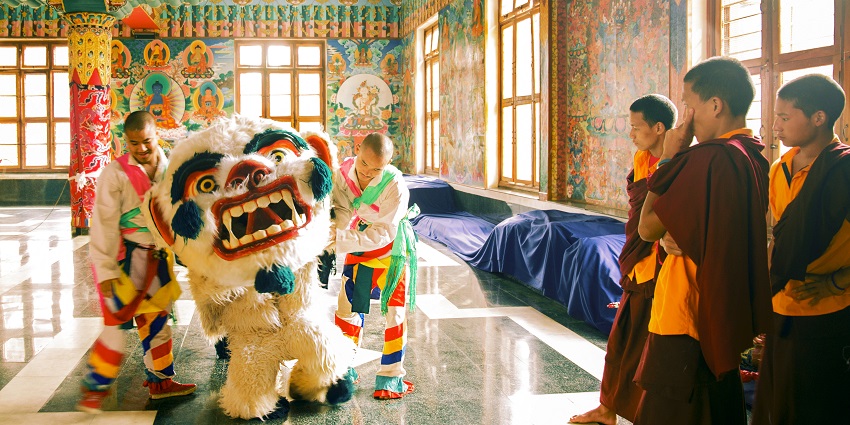
Photo: Ailiajameel / Wikimedia Commons
Tips For Travellers
- Dress modestly when visiting monasteries.
- Carry warm clothing if travelling to high-altitude regions.
- Show respect during religious ceremonies.
- Carry cash, as some festival locations may have limited ATM access.
- Avoid pointing your feet towards monks or religious objects.
- Do not touch ritual offerings unless invited to do so.
- Refrain from loud conversations during prayers.
- Do not consume alcohol inside the monastery premises.
- Carry a Camera to take some iconic Losar festival pictures.
Losar Festival serves as both a New Year celebration and a spiritual and cultural experience that binds people to ancient traditions. Losar provides a harmonious combination of celebration and worship through monastery blessings alongside cham dance performances and traditional culinary delights. Experience the Tibetan New Year festivities this year, and plan your visits with TripXL now.
Cover Photo: Storm Is Me / Shutterstock / Image For Representation Only


 WhatsApp
WhatsApp
 Twitter
Twitter









